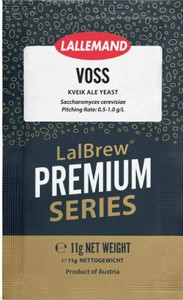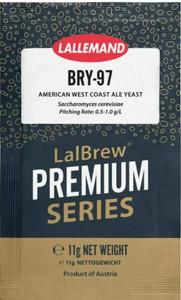
LalBrew® Nottingham High Performance Ale Yeast - Lallemand
LallemandThe Nottingham strain was selected for its highly flocculant & relatively full attenuation properties. It produces low concentrations of fruity and ester-y aromas and has been described as neutral for ale yeast, allowing the full natural flavor of malt & hops to develop. The recommended fermentation temperature range of this strain is 57° to 70°F with good tolerance to low fermentation temperatures 54°F that allow this strain to be used in lager-style beer. With a relatively high alcohol tolerance, Nottingham is a great choice for creation of higher-alcohol specialty beers!
Microbiological Properties:
- Classified as Saccharomyces cerevisiae.
- A top fermenting yeast.
The typical analysis of the active dried strain: Percent solids 93%–95% Living yeast cells 5 x 109 per gram of dry yeast Wild yeast < 1 per 106 yeast cells (Lysine method)* Bacteria < 1 per 106 yeast cells*
Finished product is released to the market only after passing a rigorous series of tests. *According to ASBC and EBC methods of analysis.
Brewing Properties:
- Quick start to fermentation, which can be completed in 4 days above 17°C.
- High attenuation, reaching a final gravity near 1008 (2°P).
- Fermentation rate, fermentation time and degree of attenuation is dependent on inoculation density, yeast handling, fermentation temperature and the nutritional quality of the wort.
- Shows flocculation at completion of fermentation, and settling is promoted by cooling and use of fining agents and isinglass.
- The aroma is slightly estery, almost neutral and does not display malodours when properly handled. Because of flocculation, it may tend to slightly reduce hop bitter levels.
- Best when used at traditional ale temperatures after rehydration in the recommended manner.
- Lager-style beer has been brewed with Nottingham, however low fermentation temperature requires adaptation of the pitching rate to ensure proper attenuation.



